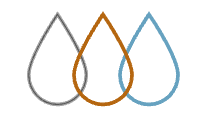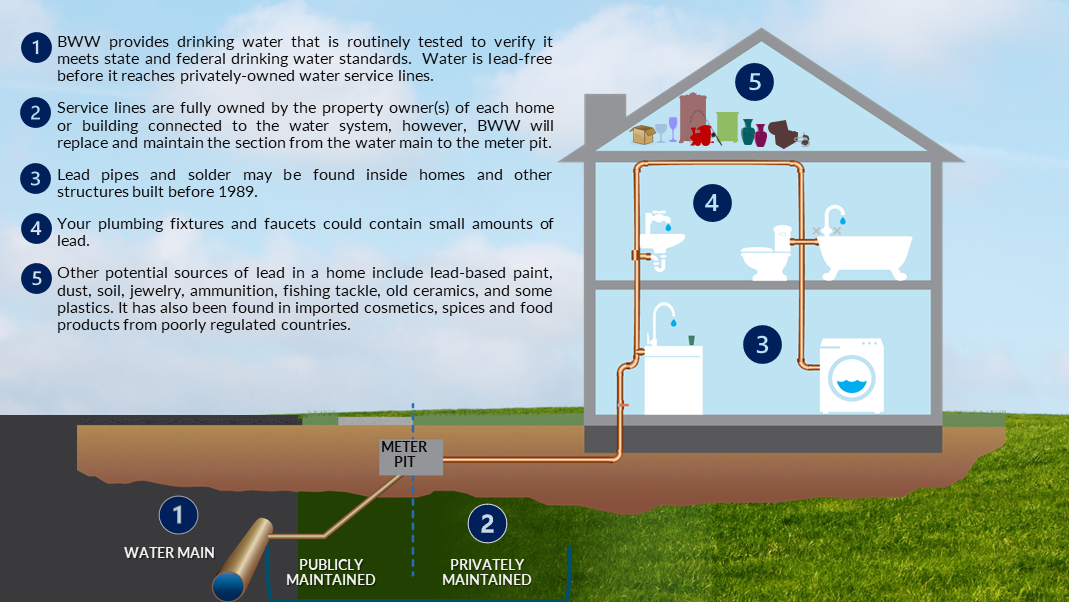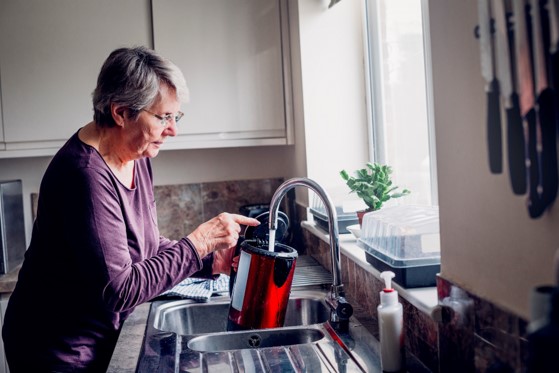Lead (Pb) Service Line FAQ’s 
Is my water safe to drink?
 Yes. The Birmingham Water Works treats, tests, and distributes high-quality drinking water to you and the community. Water provided by BWW water is lead (Pb)-free when it leaves our treatment plants, and our water mains (the pipes that distribute water throughout the community) are not made of lead. BWW manages water quality at each treatment facility to help prevent corrosion throughout the system and in privately-owned service lines and plumbing.
Yes. The Birmingham Water Works treats, tests, and distributes high-quality drinking water to you and the community. Water provided by BWW water is lead (Pb)-free when it leaves our treatment plants, and our water mains (the pipes that distribute water throughout the community) are not made of lead. BWW manages water quality at each treatment facility to help prevent corrosion throughout the system and in privately-owned service lines and plumbing.
How can lead get into drinking water?
After water leaves the BWW water main, it may be exposed to lead as it flows through privately-owned water service lines and indoor plumbing and fixtures. BWW routinely tests water at multiple sites throughout the entire water distribution system to confirm the water meets all state and federal requirements, including lead and copper limits. However, like all public water systems across the United States right now, we are diligently working to find and remove all lead service lines that could pose any health risk to our community.
Are all homes at risk?
No. We are specifically concerned about water service lines made of lead, or galvanized steel pipe that may have been attached to a lead connector or ‘gooseneck’, which is a short flexible piece of lead pipe that was commonly used to connect service lines to water mains. Many homes and non-residential buildings we serve do not have these, but potentially a large number of customers do. BWW is undertaking household surveys and in some cases, excavating service lines to confirm the presence or absence of lead.
Homes constructed between the late 1800’s through the 1945 have the highest risk. The risk for homes built after 1978 is very low, but lead pipes, solder, brass fittings and faucets containing lead were not banned nationally until 1986 through a congressional amendment to the Safe Drinking Water Act. It was not officially banned in plumbing materials in Alabama until 1989. See our Water Customers’ Guide to Lead Safety to learn more about potential sources of lead in the home and drinking water, and steps you can take to minimize any potential exposure. Older non-residential buildings with service lines smaller than 2-inches in diameter could also be at risk.
What exactly is a water service line?
The water service line is the pipe that connects a home or other types of buildings to the BWW-owned water distribution system. BWW water mains typically run underneath streets and alleys or off to the side in the public road right-of-way. The water mains feed individual service lines that run to a meter pit where the water meter is housed below ground. The service line then continues from the meter pit to the building and connects to the interior plumbing. Customer service lines are commonly made of copper, PVC or other types of plastic, galvanized steel and lead.
The illustration below shows how a water service line connects individual customers to water mains and includes information about other potential sources of lead in the home.

Who owns and maintains water service lines?
When a service line breaks, it has historically been property-owner’s responsibility to have it fixed or replaced. The property-owner owns the water service line all the way from the water main to their building. BWW owns the meter pit and water meter that it runs through.
Although the property-owner owns the entire length of the service line, BWW maintains the section of service line that runs from the water main to the meter pit and will offer to replace this part of the service line if it is found to made from lead or galvanized steel connected to a lead gooseneck.
How can I find out if my service line contains lead?
BWW is in the process of building an inventory of all water service lines connected to its system in accordance with new USEPA Lead and Copper rules. This includes researching historical records, building statistical models to predict where lead may be found, and conducting on-site investigations to confirm the presence or absence of lead. BWW provides a Service Line Look Up Tool available on its website for customers to check their service address to find out if the material has been identified. In many cases, the materials may be listed as ‘Unknown’, in which case BWW will continue its efforts over the next several years to figure out the material, including the possibility of hydro-excavating small holes on either side of the meter pit to visually inspect the service line.
I learned that my service line is not lead. Is there anything else I need to worry about?
Maybe. If you or a plumber checked the pipe entering your home or business, and its not lead, your service line may be fine. This provides one point of inspection. USEPA recommends and in the future may require water systems to inspect two points along each service line if there are no records to indicate the material. BWW may have to confirm the material of pipe that connects the meter pit to the water main. Check the database record retrieval tool on the bwwb.org website to find out if BWW has been able to identify your service line material from its records, data model or a visual inspection. It’s also possible your interior plumbing contains lead pipe, lead solder or older brass fixtures with some lead content. Read our Water Customers’ Guide to Lead Safety to learn more.
Can I have my water tested?
 Yes, you can request to have your water tested by BWW. This test is offered free-of-charge. However, it is important to understand that a negative test does not necessarily confirm your water service line is ‘Non-Lead’ because of treatment BWW provides to help prevent pipe corrosion. You can contact our Water Quality Team at (205) 244-4375 to discuss having your water tested.
Yes, you can request to have your water tested by BWW. This test is offered free-of-charge. However, it is important to understand that a negative test does not necessarily confirm your water service line is ‘Non-Lead’ because of treatment BWW provides to help prevent pipe corrosion. You can contact our Water Quality Team at (205) 244-4375 to discuss having your water tested.
I am worried about other sources of lead in my home, or that someone may have been harmed by lead. What can I do?
Be sure to read our Water Customers’ Guide to Lead Safety to learn more about potential sources of lead in the home and drinking water, and steps you can take to minimize any potential exposure. On the second page there are additional resources noted including the Alabama Childhood Lead Poisoning Prevention Program https://alabamapublichealth.gov/aclppp. There is also a national Lead Hotline you can call if you suspect someone in your household has been poisoned by lead, Ph. (800) 424-LEAD [5323].
If BWW determines our home or business has a lead service line or galvanized line requiring replacement, will it be replaced?
Yes, but this may not happen right away. Given the number of service lines that may require replacement in our system, it will take several years to plan and complete this work. USEPA has proposed requiring all public water systems ensure these service lines are replaced no later than 2037. Be sure to review our Water Customers’ Guide to Lead Safety at www.bwwb.org/leadfree to learn about extra precautions you can take to avoid lead in drinking water, and options for replacing your service line sooner.